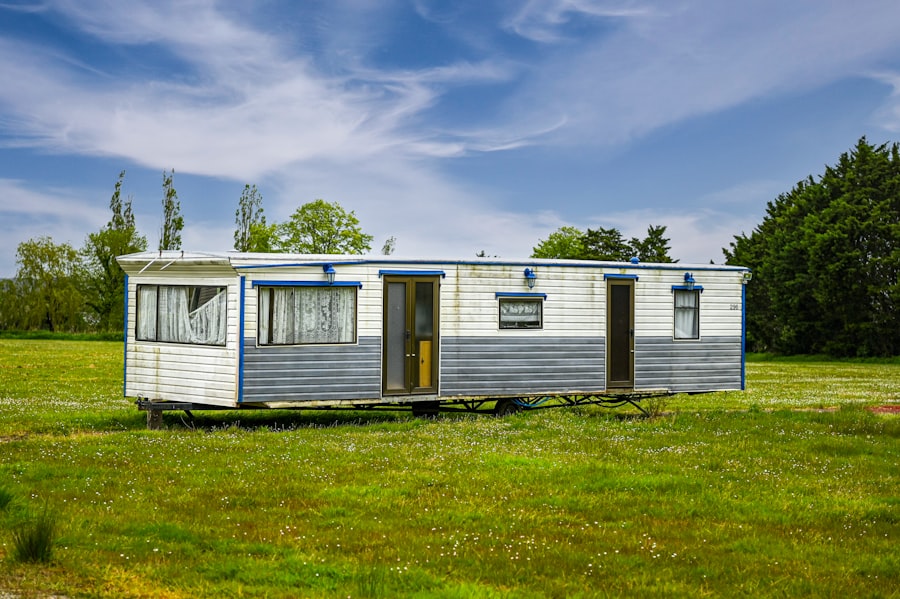Rent to own trailer homes present a unique opportunity for individuals and families seeking affordable housing solutions. One of the most significant advantages of this arrangement is the flexibility it offers. Unlike traditional home buying, where a substantial down payment is often required, rent to own agreements typically allow tenants to move in with a lower initial investment.
This can be particularly beneficial for those who may not have the savings necessary for a conventional mortgage but still desire the stability of homeownership. The ability to live in the home while gradually working towards ownership can alleviate some of the financial pressure that comes with purchasing a property outright. Additionally, rent to own agreements often provide tenants with the chance to test out the home and the surrounding community before making a long-term commitment.
This trial period can be invaluable, as it allows potential buyers to assess whether the location meets their needs and if the trailer home itself is suitable for their lifestyle. Furthermore, many rent to own contracts include provisions that allow a portion of the monthly rent to be credited towards the purchase price, making it easier for tenants to accumulate equity over time. This arrangement not only fosters a sense of ownership but also encourages tenants to take better care of the property, knowing that their efforts will contribute to their eventual purchase.
Key Takeaways
- Rent to own trailer homes offer an accessible path to homeownership with flexible payment options.
- Understanding the rent to own process is crucial to avoid pitfalls and ensure clear terms.
- Researching local affordable trailer homes helps find the best deals suited to your budget.
- Proper maintenance and upkeep are essential to preserve the home’s value and livability.
- Being aware of financial and legal considerations protects your investment and rights in rent to own agreements.
Understanding the Rent to Own Process
The rent to own process can be broken down into several key stages, each of which plays a crucial role in ensuring a successful transition from tenant to homeowner. Initially, prospective buyers must identify a suitable trailer home and negotiate the terms of the rent to own agreement with the seller or landlord. This negotiation phase is critical, as it sets the foundation for the entire arrangement.
Key elements such as the duration of the rental period, monthly payment amounts, and the final purchase price should be clearly defined and agreed upon by both parties. Once an agreement is reached, it is essential for both parties to understand their rights and responsibilities throughout the rental period. Typically, tenants are responsible for maintaining the property and covering utilities, while landlords may be tasked with major repairs and structural issues.
Clear communication and documentation are vital during this phase to prevent misunderstandings or disputes later on. As the rental period progresses, tenants should keep track of their payments and any credits accrued towards the purchase price, ensuring they are well-informed about their financial standing as they approach the end of the rental term.
Finding Affordable Trailer Homes in Your Area

Locating affordable trailer homes can be a daunting task, especially in areas where housing prices are on the rise. However, there are several strategies that prospective renters can employ to find suitable options within their budget. One effective approach is to utilize online real estate platforms that specialize in mobile homes and trailer listings.
Websites such as Zillow, Realtor.com, and Craigslist often feature a variety of listings that cater to different price ranges and locations. By filtering search results based on specific criteria such as price, size, and amenities, potential renters can quickly identify homes that meet their needs. In addition to online resources, local community boards and social media groups can serve as valuable tools for finding affordable trailer homes.
Many communities have Facebook groups dedicated to housing opportunities where members can post available rentals or seek recommendations from others. Networking within these groups can lead to discovering hidden gems that may not be listed on traditional real estate websites. Furthermore, reaching out to local real estate agents who specialize in mobile homes can provide additional insights into available properties and market trends in the area.
Steps to Take Before Committing to a Rent to Own Agreement
| Step | Description | Key Considerations | Estimated Time |
|---|---|---|---|
| 1. Research the Market | Analyze local real estate trends and rent-to-own options. | Compare prices, neighborhoods, and demand. | 1-2 weeks |
| 2. Understand the Agreement Terms | Review contract details including rent credits, purchase price, and duration. | Look for hidden fees and flexibility clauses. | 3-5 days |
| 3. Inspect the Property | Conduct a thorough home inspection to identify issues. | Consider repair costs and property condition. | 1-3 days |
| 4. Verify Seller’s Ownership | Confirm the seller legally owns the property and can rent-to-own. | Check public records and title status. | 2-4 days |
| 5. Assess Financial Readiness | Evaluate your credit score, savings, and ability to secure financing later. | Plan for down payment and monthly rent. | 1 week |
| 6. Consult a Real Estate Attorney | Get professional advice to review the contract and legal implications. | Ensure your rights and obligations are clear. | 3-7 days |
| 7. Negotiate Terms | Discuss and adjust contract terms to suit your needs. | Focus on purchase price, rent credits, and exit options. | 1-2 weeks |
| 8. Plan for Future Financing | Prepare to secure a mortgage or loan when the option to buy arises. | Check lender requirements and improve credit if needed. | Ongoing |
Before entering into a rent to own agreement, it is crucial for prospective buyers to conduct thorough due diligence on both the property and the terms of the contract. One of the first steps is to inspect the trailer home carefully. This includes checking for any signs of damage or needed repairs, as well as assessing the overall condition of essential systems such as plumbing, electrical, and HVAEngaging a professional home inspector can provide an unbiased evaluation and help identify any potential issues that may not be immediately visible.
In addition to inspecting the property, potential renters should also review the terms of the rent to own agreement meticulously. It is advisable to consult with a real estate attorney or a knowledgeable advisor who can help interpret complex legal language and ensure that all terms are fair and reasonable. Key aspects to focus on include the length of the rental period, how much rent will contribute towards the purchase price, and any clauses related to maintenance responsibilities or penalties for late payments.
Understanding these details will empower renters to make informed decisions and avoid pitfalls that could jeopardize their path to homeownership.
The Importance of Proper Maintenance and Upkeep
Proper maintenance and upkeep of a trailer home are essential components of a successful rent to own experience. As tenants work towards ownership, taking care of the property not only preserves its value but also ensures a safe and comfortable living environment. Regular maintenance tasks such as cleaning gutters, checking for leaks, and servicing appliances should be prioritized.
By staying proactive about upkeep, tenants can prevent minor issues from escalating into costly repairs that could impact their financial situation. Moreover, maintaining a good relationship with the landlord or seller is crucial during this period. Open communication regarding any maintenance concerns or repairs needed can foster trust and collaboration between both parties.
In many cases, landlords may appreciate tenants who take initiative in caring for the property, which could lead to more favorable terms when it comes time to finalize the purchase agreement. Ultimately, diligent maintenance not only enhances the living experience but also reinforces a sense of pride in homeownership.
Financial Considerations for Rent to Own Trailer Homes

When considering a rent to own trailer home, it is vital for prospective buyers to evaluate their financial situation comprehensively. This includes assessing current income levels, existing debts, and overall budget constraints. Understanding how much one can afford in monthly payments is crucial in determining whether a rent to own agreement is feasible.
It is advisable for individuals to create a detailed budget that accounts for all living expenses, including utilities, insurance, and maintenance costs associated with owning a trailer home. Additionally, potential buyers should consider how their credit score may impact their ability to secure financing when transitioning from renting to owning. A strong credit score can lead to more favorable loan terms and lower interest rates when it comes time to finalize the purchase.
If credit issues exist, taking steps to improve one’s score prior to entering into a rent to own agreement can be beneficial. This might involve paying down existing debts or ensuring timely payments on current obligations. By addressing these financial considerations early on, prospective buyers can position themselves for success in their journey toward homeownership.
Navigating the Legal Aspects of Rent to Own Agreements
The legal aspects of rent to own agreements can be complex and vary significantly from one jurisdiction to another. It is essential for both parties involved in such agreements to understand their rights and obligations under local laws. Typically, these contracts should outline critical elements such as purchase price, rental duration, maintenance responsibilities, and any contingencies related to financing or repairs.
Ensuring that all terms are clearly defined helps prevent disputes down the line. Engaging legal counsel experienced in real estate transactions can provide invaluable guidance throughout this process. An attorney can help review contract language for clarity and fairness while also advising on any local regulations that may impact the agreement.
Additionally, understanding state-specific laws regarding tenant rights can empower renters with knowledge about what protections they have under various circumstances. By navigating these legal aspects carefully, both parties can establish a solid foundation for their rent to own arrangement.
Resources and Support for Rent to Own Trailer Home Residents
For individuals pursuing rent to own trailer homes, numerous resources and support systems are available to assist them throughout their journey. Local housing authorities often provide information on affordable housing options and may offer programs specifically designed for low-income families seeking homeownership opportunities. These organizations can serve as valuable advocates for renters navigating complex housing markets.
Furthermore, online forums and community groups dedicated to mobile home living can provide peer support and shared experiences from others who have gone through similar processes. These platforms often feature discussions on best practices for maintaining trailer homes, tips for negotiating contracts, and advice on financial planning related to homeownership. By tapping into these resources, prospective buyers can gain insights that enhance their understanding of rent to own agreements while fostering connections within their communities.
In conclusion, pursuing a rent-to-own trailer home offers numerous benefits while requiring careful consideration of various factors throughout the process. From understanding financial implications and legal aspects to maintaining open communication with landlords and utilizing available resources effectively—each step plays an integral role in achieving successful homeownership through this unique arrangement.



